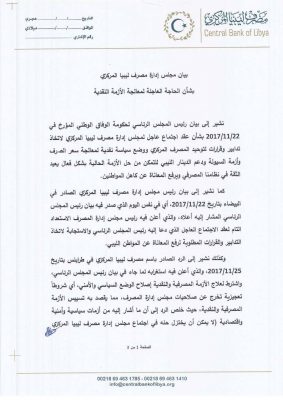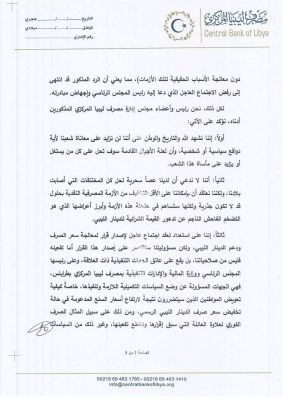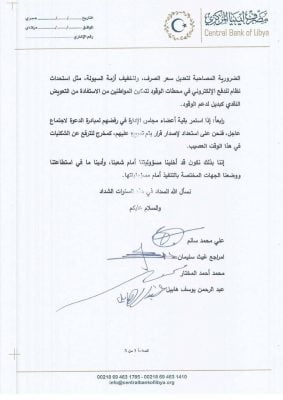By Sami Zaptia.

London, 17 December 2017:
The Beida-based Central Bank of Libya (CBL), recognized by the House of Representatives (HoR), the only internationally recognized Libyan legislature, has repeated its call for the holding of an urgent meeting of the full unified Board of the CBL.
The Beida CBL statement, signed by four Board members (Ali Hibri, Mraja Ghait, Mohamed Al-Mukhtar and Abdelrahman Habil), accused the Tripoli CBL of refusing to hold a board meeting by insisting on preconditions and by politicizing Libya’s banking and financial crisis.
https://www.libyaherald.com/2017/11/18/beida-cbl-governor-hibri-blames-tripoli-cbl-governor-for-economic-woes-says-dinar-should-be-devalued-to-ld-6-per-dollar/
The Beida CBL statement noted that it had agreed to the holding of an urgent CBL Board meeting in a statement on the same day (22 November 2017) that the Faiez Serraj-led Government of National Accord had called for one.
https://www.libyaherald.com/2017/11/28/cbl-conditionally-agrees-to-serraj-call-for-unified-board-meeting/
It said that such a meeting was needed in order to ”unify” the CBL, agree on monetary policy to solve the exchange rate problem and dinar valuation, solve the cash shortage crisis, return confidence in the Libyan banking system and reduce the financial and economic burden on Libyan citizens.
CBL Beida noted, however, that the Tripoli CBL had in its 25 November reply put up preconditions that were outside the scope of competence of a central bank by insisting that there is prior political unity and security and subsidy reform. CBL Beida referred to CBL Tripoli’s comment that Libya’s financial problems could not be reduced to the holding of a board meeting without solving the root causes of these problems.
Not withstanding all of the above, CBL Beida said that while it might indeed not have a ”magic stick” to solve the root causes of all of Libya’s financial problems, but it could take steps that might help reduce these problems.
Beida CBL stressed that while it was prepared to hold an urgent Board meeting to revalue the Libyan dinar, its responsibility ends with the making of such a monetary decision. It explained that the execution of such a decision does not lie within its scope of responsibility, but lies with the relevant executive powers, headed by the Presidency Council, Ministry of Finance and the executive branches of Tripoli CBL.
It is these executive bodies that are responsible for putting in place the necessary complimentary policies for their implementation. These would include policies on how to compensate citizens that will suffer from price rises in subsidised goods.
Finally, Beida CBL warned that if Tripoli CBL Board members continued in their refusal to hold an urgent Board meeting, the Beida CBL Board members would be prepared to make such a decision on their behalf as an exit from the current impasse.
With the release of this statement, the four undersigned Beida Board members said that they had taken the steps they could within their responsibilities and that they had clarified their responsibilities before the Libyan people.
In the same vein, it will be recalled that Tripoli-CBL Board member Tarik Yousef had confirmed during the Rome 2017 Mediterranean Dialogue meetings earlier this month that the Libyan dinar would be devalued in 2018 – but in parallel with the executive implementing other necessary economic reform measures. These were to include subsidy reform.
Yousef had said that the CBL and the Presidency Council and other Libyan state authorities (the Audit Bureau) had now reached agreement on the way forward. Answering a question in Rome from Libya Herald he had said that there was no policy tension between the CBL, PC and Audit Bureau, but admitted that they had spent quite a bit of time on ”sequencing”.
He said that discussions were focused on ”policy effectiveness” rather than the public perception of policy and legitimacy differences.
It will be recalled that Saddek El-Kaber was first dismissed from his post back in April 2015. The decision (No. (14) of 2015) to sack him was signed by Ali Hibri, who at the time represented the only internationally recognized government and parliament, the House of Representatives (HoR).
https://www.libyaherald.com/2015/04/09/cbl-governor-saddek-elkaber-sacked-by-hor-again/
He was subsequently sacked from his post for a second time by the HoR on 14 September 2014 after he had failed to turn up to Tobruk for questioning.
El-Kaber justifies remaining in his post on the bases of the fact that Libyan law and CBL regulations do not allow for a vacant post of Governor. Kaber would only vacate his post if his replacement arrived in Tripoli.
Secondly, the Skhirat Libyan Political Agreement stipulates that all HoR decisions taken since 2014 would be reviewed by a joint committee. This would include the decision to dismiss Kaber. No joint committees have met or reviewed the CBL Governorship yet.
Kebir also does not recognize any CBL decisions taken in meetings held outside Libya, such as those held in Tunisia. Libyan law / CBL regulations stipulate that all such decisions must be taken in meetings held within Libya.
CBL law does stipulate that a Board meeting should be held every month and that a public call for such a meeting needs to be made. A Board meeting can be called by the Governor, his Deputy or any three Board members.
It is also important to bear in mind that while the Governorship of the CBL is contested between the two Tripoli-based and Beida-based ”Governors”, the CBL Board of Directors is not. Its seven members are uncontested. Four members are based in or aligned to the east and three were based in or aligned to the west. One western-based member resigned recently for personal reasons, and his position remains vacant. This leaves only two CBL Board members active in the west.










